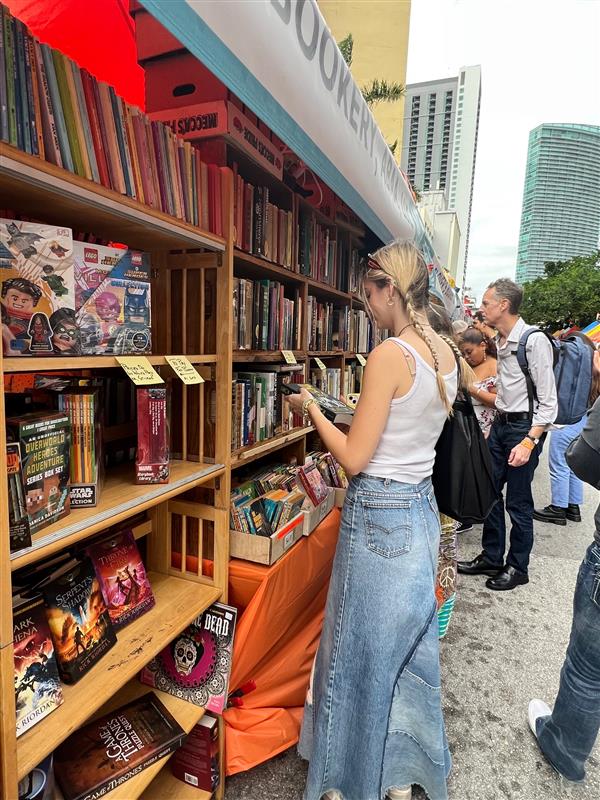For three festive and colorful days, The Miami Book Fair transformed Miami-Dade College’s (MDC) Downtown Campus into a marketplace of literary delights. The street fair ran from Nov. 18 to Nov. 20 and marked the ending of the larger book fair, acting as a final celebration of authors and readers alike.
The Miami Book Fair ran for eight days, from Nov. 13 to Nov. 20 and closed out by hosting the open-air marketplace that publishers and authors used to promote their books to the Miami literary community. A series of panels hosted by writers and other professionals in the publishing industry were also speckled throughout the fair’s final days.
Anjolie Scott, a junior majoring in English, was pleased with the attendance and energy at the event.
“I was surprised by how many people showed up,” Scott said. “Surprised and happy, because it means that there’s a lot of fondness and appreciation for reading and books.
Scott was also glad that the fair was representing a range of diverse voices and authors, including Caribbean and Ibero-American writers.
“I think publishing companies are realizing that they can publish more diverse stories.I think it’s really good to have booths with books in Spanish,” Scott said.”I think it encourages more people to read because some people would feel alienated if the books were only in English. Reading is for everybody. Stories are for everyone.“
As a writer herself, Scott also appreciated the sense of connection.
“It feels really encouraging to be around other book lovers and to also have authors there,” Scott said. ”It made me happy to see a thriving community of writers.”
Some attendees had less positive experiences with the fair. Alain Fernandez, a student at MDC that attends the book fair every year, felt that, this time around, it was too focused upon pushing sales above encouraging the community to get involved with reading.
“The harsh tourist capitalism of Miami I think got to it,” Fernandez said. “The people renting stations were using it to either make money or reach a status they could post on their publisher’s page. It didn’t feel like a fair, it felt like a bookstore.”
Fernandez also expressed concern about the fringe views being circulated by certain vendors.
“I don’t know how the fair is organized, but there needs to be some sort of screening process,” Fernandez said. “There were several stations that encouraged alternative medicines and beliefs and some seemed to encourage the use of spirituality over actual medicine which could legitimately lead to the loss of someone’s life.”
Fernando Fabrizio Díaz Contin, a fantasy and horror author who was promoting his book at the fair, found it useful to be able to connect with people who were already interested in literature and ready to hear about what his writing had to offer.
“The most important part about selling in a fair is being able to speak to everybody,” Diaz Contin said. “As long as you speak to everybody, you get a very good connection to the people because they are interested in buying your book. They’re not in a fair for buying purses, they’re buying books, so show them that you’re passionate about your book, why you love your characters — that’s what they want to hear.”
The key to selling and popularizing one’s book, Díaz Contin expressed, is simply persevering.
“Being a writer, you need a lot of persistence,” Díaz Contin said. You’re not going to become a millionaire one day to another. If you don’t love it you’re not going to fight for it. People need to fight for what they love.”







